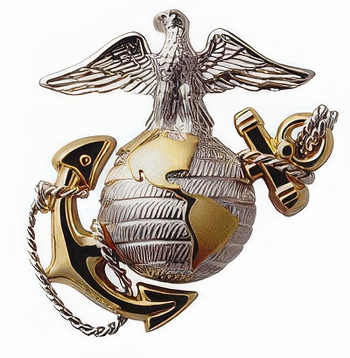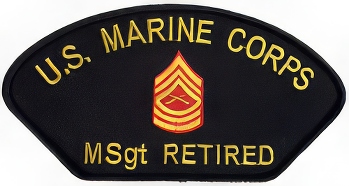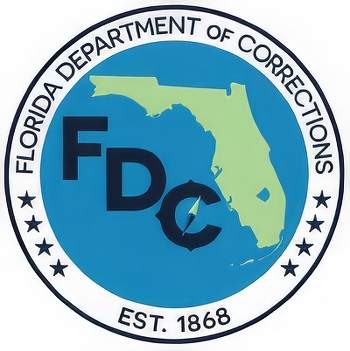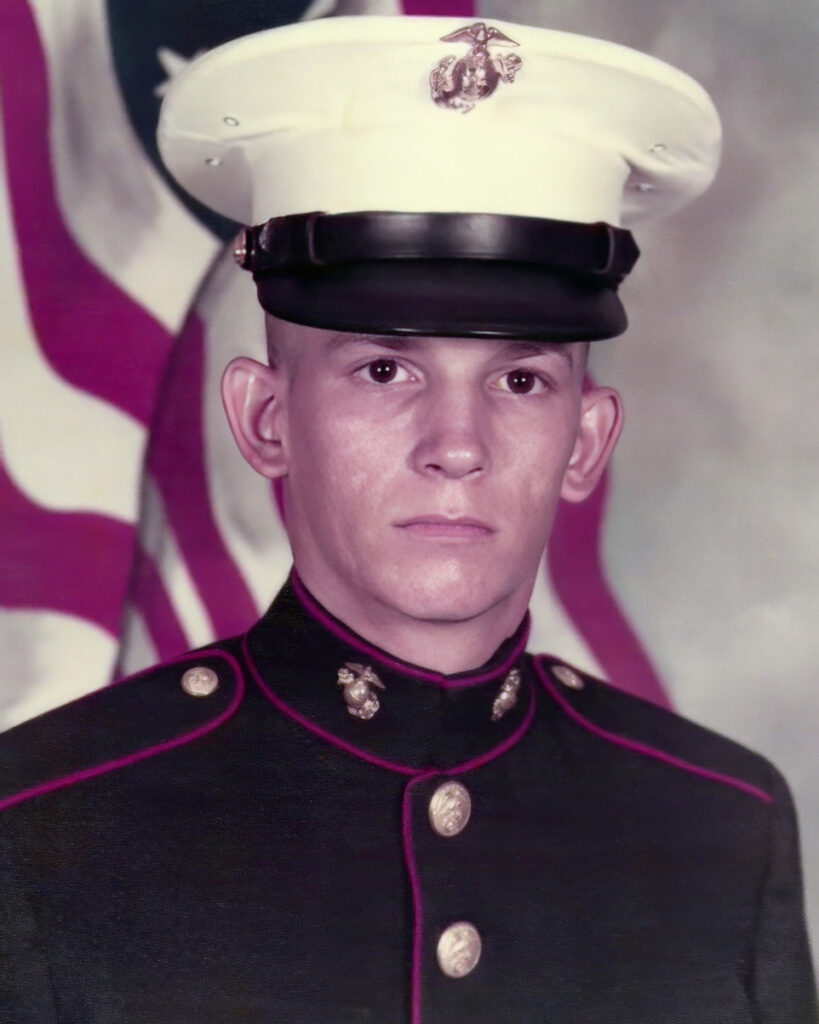PRESERVING A MILITARY LEGACY FOR FUTURE GENERATIONS
The following Reflections represents MSGT Terry Bacon’s legacy of his military service from 1977 to 1998. If you are a Veteran, consider preserving a record of your own military service, including your memories and photographs, on Togetherweserved.com (TWS), the leading archive of living military history. The following Service Reflections is an easy-to-complete self-interview, located on your TWS Military Service Page, which enables you to remember key people and events from your military service and the impact they made on your life. Start recording your own Military Memories HERE.
Please describe who or what influenced your decision to join the Marine Corps.

When I was about 7 or 8, I had an uncle who had returned from Vietnam. It was in ’67 or ’68. He was a door gunner and crew chief on a UH-34D. When he got home, he gave me an eagle, globe, and anchor to play with, and I carried it with me everywhere. It left a lasting impression on me for a long time.
I also had two uncles that served in the Marine Corps during the Korean War. Neither one talked much about the war, only to say that it was cold, and the Marines will make a man out of you.
In our senior year of high school, my best friend and I started talking about joining. His brother was a Viet Nam Marine, and his dad was a pre-WWII Marine.
Talk turned into a bet, and we joined on the buddy system. We wanted to see if we could honorably carry on our family’s tradition of being the Few and the Proud.
Whether you were in the service for several years or as a career, please describe the direction or path you took. What was your reason for leaving?

After Boot Camp at Parris Island, I was slated for Intel school at Fort Huachuca, AZ, but it was phased out for Marines. I was sent to Camp Lejeune, HQ Co, HQ Bn, to complete my six-month active duty commitment. Upon completing that, I went to my reserve unit (VMA-142 (A-4 Sky Hawks) at NAS Cecil Field, FL.
I attended Phase I and II of the Amphibious Intelligence Specialist Course in Little Creek, VA.
I also participated in SERE and Advanced SERE training at North Island, CA. Meeting Doug Hegdahl was a highlight of the course as he was an instructor at the SERE course. He was a Navy Petty Officer 2nd Class who was held as a prisoner of war by the North Vietnamese during the Vietnam War in the infamous “Hanoi Hilton,” which imprisoned downed pilots.
In January 1991, I was activated during Desert Storm and 21 other Reserve Intelligence Marines in the 4th MAW. We were to support Intel activities already in-country. As we landed and briefed, we were told there was no job for us, and we were made combat replacements throughout the SWA theater of operations. I was attached to the 2nd Bn 7th Marines, 1st Mar Div out of 29 Palms, CA, for the duration of ground activities. Upon deactivation for active duty, I returned to my reserve unit and civilian life.
In August 1997, my reserve unit held its last drill at NAS Cecil Field due to the Base Realignment And Closure Act (BRAC). The squadron moved to NAS Marietta, GA. Since I had my 20 years, I chose to retire.
If you participated in any military operations, including combat, humanitarian and peacekeeping operations, please describe those which made a lasting impact on you and, if life-changing, in what way?

As an Air Wing Reservist, I was activated and sent to Southwest Asia as part of a 22 man Intel group from the 4th MAW. As we arrived in country, we readily became combat replacements. I was reassigned as the Intel Chief to the 2nd BN 7th MAR 1st MAR DIV from 29 Palms, CA. They had been in-country since late August or early September and were hard as hell and ready to fight.
As for combat, the battalion had passed through the Saudi/Kuwaiti berm and into Kuwait two days before ground operations began. As we dug in, the Iraqi fired a couple of rounds at the Battalion CP. The Air Officer called in two F/A18’s and demoralized their fighting spirit for the day. The XO moved us back, and later that night, they dropped about 50 rounds on the position where we had been.
We then breached the minefields and took more incoming fire. Our next objective was to help secure Al Jaber Air Field. After the airfield was taken, we moved north about 32 kilometers from Kuwait City and cleared bunkers for over a week. Our job completed, we retrograded back to Manifa Bay.
As 2/7 was gearing up to head back to the US, I went back to the Intel unit, where I was initially assigned. We were housed at Camp 5, Al Jubail, and worked for several weeks until our time was up to head back to the states.
Did you encounter any situation during your military service when you believed there was a possibility you might not survive? If so, please describe what happened and what was the outcome.

None that I can remember. However, when we first received incoming fire, it was pretty close. A water can in the CP took a hit by some shrapnel. An SSgt from the Comm Platoon was caught out in the open. He hit the deck, and waited a few seconds, dropped his pack and gear. In a hole next to me, my Sgt yelled, “RUN,” he got up and sprinted to the Sgt.’s hole and jumped in.
The Iraqi’s fired several more rounds at the CP. The Air Officer with the Battalion called in a couple of FA-18‘s, eliminating the threat. The XO had the Company move back a couple of clicks, and that night they put about 50 rounds in the spot we were at previously. If we had stayed in that position, we could have been severely torn up.
Of all your duty stations or assignments, which one do you have fondest memories of and why? Which was your least favorite?

After I graduated boot camp at Parris Island, I went to Hq Co, Hq Bn, 2nd, MARDIV Camp Lejuene, NC, waiting on an Intel school. While there, I learned the daily life in the Marine Corps that I wouldn’t have if I had gone directly to a formal school.
I wasn’t there a month and had an IG junk on the bunk inspection. Interservice boxing matches at Goettge Field House were always a big night.
From your entire military service, describe any memories you still reflect back on to this day.

My 20-year reserve career is a memorable and proud part of my life, but my time in Operation Desert Storm with 2/7 is the most gratifying. When I was activated, my unit was transitioning from A-4 Skyhawks to F/A-18 Hornets, and we had no aircraft when Operation Desert Shield broke out.
I was the only Marine from my reserve unit to get activated. And then, a reserve air wing marine was getting orders with an active duty grunt unit from the stumps. Who would have figured this? But hey, a Marine is a Marine, and you do your job. One of the active-duty 1st Lt.’s in the Bn used to be an enlisted reservist in my reserve unit.
True story – One older couple in my church said to me on the day I was leaving that their grandson was over there, and if I saw him, would I say hello to him for them. Of course, I said sure I would. But with 90 thousand Marines in-country, what was the odds. Within 2 hours of being dropped off at the Battalion CP, everyone was asking me questions: where you are from; what do you do in civilian life; this LCPL overheard us talking and began asking where I was from in Florida. I told him, and he asked me did I know where a particular town was (where I went to high school). I said yes. I then called him by name told him his grandparents sent him hello. Everybody went crazy and didn’t believe it. He went and got a picture, and I named everyone from his grandparents, mom, dad, and step-parents.
It is a small Marine Corps world in which we live.
What professional achievements are you most proud of from your military career?

Probably completing my entire 20-year reserve career and making Master Sergeant. My best friend who signed up with and went in on the buddy system did his six-year reserve commitment and got out. He was self-employed, and it didn’t fit into his work schedule.
I had a good mentor and friend on active duty in the Squadron, and I was a Sgt. And I reenlisted for three more years. I got promoted to SSgt and, again, reenlisted for three more years. Then promoted to GySgt, reenlisted for yet another three more years. I was promoted to MSgt and an all non-obligor, of course. I had my 20 years, and the Squadron moved, and I retired.
Of all the medals, awards, formal presentations and qualification badges you received, or other memorabilia, which one is the most meaningful to you and why?

As all Marines are, indoctrination in warfighting begins in boot camp and carries on throughout our training. Someone once said, “We train for war, but pray for peace.” And when that day comes, we must be prepared to run to the sound of the guns. They called, I went. A reserve air winger to an active duty grunt battalion.
These Marines taught me so much about camaraderie, esprit de corps, and corps values in the short time I was with them. The time I spent in combat and being awarded the Combat Action Ribbon signifies to me that this is what Marines do. Fight wars. Engage the enemy. It was my time, my war. I carried my pack, humped my load, just like my brothers did before me, and my brothers after me.
Which individual(s) from your time in the military stand out as having the most positive impact on you and why?

MSgt. Mike Blum, assigned to MAG 42 Det. As the active-duty Intel Chief for about three years. He was a significant influence on my professional military growth as well to me as a person. MSgt. Blum was a great mentor to me and the other reserve Intel Marines in our unit. His knowledge and experience during his career, spanning from Viet Nam to HQMC, were invaluable to me. I consider him a true friend.
List the names of old friends you served with, at which locations, and recount what you remember most about them. Indicate those you are already in touch with and those you would like to make contact with.

Being a Reservist, you meet all sorts of people from all walks of life when you go on a CAX at 29 Palms or other types of Annual Training, be it at NAS Fallon, MCAS Yuma, or get to go with 21 other Intel Marines and go off to Southwest Asia.
SSgt. Anthony Tasso worked with me in the S-2 shop in VMFA-142. He applied and received a direct commission into the US Navy Reserve. The last contact I had with him several years ago, he was a Lt Commander still in a drilling unit.
What profession did you follow after your military service, and what are you doing now? If you are currently serving, what is your present occupational specialty?

After fulfilling my reserve obligation, I began a career with the Florida Department of Corrections as a Correctional Officer. Working in state prison is intense enough, but being a 5’7″,135 lbs 18 years old, it was eye-opening. My dad had been working for the prison system at the time, and this was the only job open in the area.
Initially, it was challenging, but my Marine Corps training gave me the intestinal fortitude to step up each day to face the task. I have been on several emergency response teams: Baton Squad, Munitions Squad, and CERT Team.
I retired from the Florida Department of Corrections after 35years of service. I was the Administrative Lieutenant for the oldest and largest major prison in one compound in Florida. The institution housed death row, mental health, close management, and aging inmates.
In what ways has serving in the military influenced the way you have approached your life and your career? What do you miss most about your time in the service?

I feel the Marine Corps has given me a drive in my life that no other training could have given. No college, trade school, or additional “basic training” could take and develop young men and women and turn them into the leaders they will become.
Throughout my career, I have always taken a leadership role, squad leaders, team leaders, etc. It was brought on because of my military training in drill and tactics. As my two sons grew, I strive to teach them the same values the Marine Corps taught me.
Be honorable, Be courageous, and Be committed. Also, to never give up and always do your best.
Based on your own experiences, what advice would you give to those who have recently joined the Marine Corps?

The Marines that came before us have given us a great legacy to carry on. It is up to us and the Marines that come after us to carry on that great legacy. I saw that during my time in Desert Storm, and I see that still today from the young Marines serving in Iraq and Afghanistan.
The Corps is a force in readiness that must be ready to meet any challenge on any battlefield. Today’s Marines must be fierce warriors and quality citizens to be our leaders of tomorrow.
In what ways has togetherweserved.com helped you remember your military service and the friends you served with.

I retired in 1998. TWS has brought me back to a sense of camaraderie with the Corps. Since joining, I found two brothers I went to boot camp with, and one was my rack buddy.
I went to one of my uncle’s funeral and found out that a second cousin is a retired SgtMajor. Another second cousin was the Squadron SgtMajor of the MAGDET when I was a young Lance Corporal.
When I returned home and checked the site, he listed me as a brother. The relationships and contacts are endless. From the Marines I served within a reserve status and from those while on active duty in Desert Storm, you can find many Marines and get in contact again. Absolutely outstanding.
PRESERVE YOUR OWN SERVICE MEMORIES!
Boot Camp, Units, Combat Operations
Join Togetherweserved.com to Create a Legacy of Your Service
U.S. Marine Corps, U.S. Navy, U.S. Air Force, U.S. Army, U.S. Coast Guard

I enjoyed your reflections. Thank you for sharing. Semper Fi